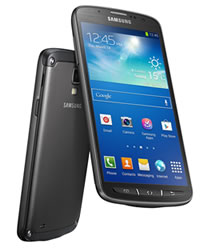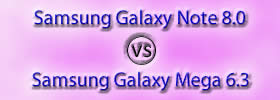Difference between Samsung Galaxy S4 Active and HTC One X+
Key Difference: Samsung announced that it has added a new phone to its lineup that combines the ruggedness of the older Samsung Xcover with the features and oomph of the new Galaxy S4. S4 Active is dust and water-proof. The phone comes with a 5-inch Full HD TFT capacitive touchscreen that differs from the AMOLED used in the S4. The HTC One X+ sports a 4.7-inch super LCD 2 touch screen with approximately 312 ppi pixel density, meaning the screen is pretty awesome and it does not show any pixels. The device is powered by 1.7 GHz Quad-core NVIDIA Tegra 3 process making it faster than the original HTC One X.
 Samsung announced that it has added a new phone to its lineup that combines the ruggedness of the older Samsung Xcover with the features and oomph of the new Galaxy S4. S4 Active is dust and water-proof and aims to provide direct competition to the Sony Xperia Z. The phone is aimed at the users that require their phone to be durable as well as provide extra features. According to the CEO and President of IT & Mobile Communications Division at Samsung Electronics, JK Shin, the phone is designed for the people who love the outdoors.
Samsung announced that it has added a new phone to its lineup that combines the ruggedness of the older Samsung Xcover with the features and oomph of the new Galaxy S4. S4 Active is dust and water-proof and aims to provide direct competition to the Sony Xperia Z. The phone is aimed at the users that require their phone to be durable as well as provide extra features. According to the CEO and President of IT & Mobile Communications Division at Samsung Electronics, JK Shin, the phone is designed for the people who love the outdoors.
Samsung Galaxy S4 Active shares many features with the S4, but differs in terms of design and aesthetics. The S4 Active is thicker and heavier at 151 grams; the weight is mostly because of the added water and dust proof. The phone has a diamond-pattern textured back that makes it easier to hold the device. The company has also removed the capacitive buttons and replaced them with hardware buttons. The top of the phone houses the 3.5mm headphone jack and has the words waterproof etched next to it. The top also houses the secondary mic and the IR emitter. The volume rocker is on the left side of the phone, while the right side has the power/lock key. The bottom of the phone has the microUSB / MHL 2.0 port that is sealed with a plastic flap. The proximity sensor, light sensor and the IR motion detector are placed on the front above the screen near the speaker. The back of the screen houses the camera and the LED flash.
The phone comes with a 5-inch Full HD TFT capacitive touchscreen that differs from the AMOLED used in the S4. It has ~441 ppi pixel density and is protected by corning gorilla glass 3. The phone is powered by 1.9 GHz Krait 300 Quad-core Qualcomm Snapdragon 600, has Adreno 320 GPU and 2GB RAM. The phone comes with Android 4.2.2 Jelly Bean. The TouchWiz UI changes certain Jelly Bean features offering users with more options. The lockscreen features new widgets such as displaying personal messages overlaid on photos from the TripAdvisor. The water ripples effect has been replaced by the lens flare effect, but can be switched or disabled completely. The lockscreen also offers multiple screen on which users can add widget. Another cool feature is the Quick Glance feature that uses a proximity sensor to detect nearby movement and automatically lights up to display time and notifications.
The company has replaced the 13 MP camera with an 8MP rear camera that as a capability to work underwater. The volume rocker can be changed into a temporary camera shutter button that allows users to click photos and record videos underwater. The hardware buttons are also provided for the same purpose. The phone offers 16 GB internal storage capacity of which around 11 GB is available to the user. However, the storage can be expanded by 64 GB using a microSD card.
The same amazing features that were offered in Galaxy S4 is available in the S4 Active; including gestures, hovering, air wave, smart play, smart scroll and many other fun features. The phone also comes with an Aqua Mode that can be applied to increase visual quality and clarity for enhanced underwater images. The company has also added certain helpful Samsung Apps including Samsung Hub, S Travel (Trip Advisor), S Health and S Translator that can translate as well as pronounce many different kinds of language. The camera also comes with many different features such as Drama Shot, Sound&Shot, Story Album and Group Play. However, it is unsure if the phone offers Dual Shot or Dual recording. The phone also comes with an IR blaster that can covert the phone into a remote.
 HTC is a popular smartphone company and has been touted for many beautifully designed phones. The phones are smart, sleek and to the point with no extra marketing gimmick. HTC maintains this with the launch of the HTC One X+. The HTC One X+ is a new phone that shares many similarities to its big brother the HTC One X; however, it also shines in many places where the predecessor shied. The HTC One X+ is basically an upgraded version of the HTC One X and hit the market in November 2012.
HTC is a popular smartphone company and has been touted for many beautifully designed phones. The phones are smart, sleek and to the point with no extra marketing gimmick. HTC maintains this with the launch of the HTC One X+. The HTC One X+ is a new phone that shares many similarities to its big brother the HTC One X; however, it also shines in many places where the predecessor shied. The HTC One X+ is basically an upgraded version of the HTC One X and hit the market in November 2012.
The HTC One X+ sports a 4.7-inch super LCD 2 touch screen with approximately 312 ppi pixel density, meaning the screen is pretty awesome and it does not show any pixels. The screen has excellent resolution and shows sharp and crisp clear photos and videos. The screen is protected by Corning Gorilla Glass 2 that keeps it from getting minor day-to-day scratches. The device is sleek and thin in general, but has put on a little extra weight (5 grams) compared to the original One X. The phone is covered in a soft-touch polycarbonate plastic chassis that has smooth curved corners. The soft matte plastic makes it easy to grip the phone and keeps it from slipping through the fingers. The phone comes incorporated with the HTC Sense UI v4+, which is basically a combination of the HTC Sense and Jelly Bean. The combination of the two provides additional features such as: Google Now, Voice search, faster screen navigation, new gallery app (organizes photos by events and location) and HTC Get Started (allows PC to configure the phone faster).
The device is powered by 1.7 GHz Quad-core NVIDIA Tegra 3 process making it faster than the original HTC One X. The faster processor allows seamless transitions between apps and makes the device smooth to work with. There was no hindering or jerking when operating the device. The One X+ comes installed with Android v4.1 (Jelly Bean) right out of the box. The device comes with 32 and 64 GB internal storage capacity that is not expandable and 1 GB RAM.
The device houses an 8 MP rear camera with auto focus, LED flash, and BSI sensor, along with a 1.6 MP front camera for video conferencing. The front camera also has a countdown features that counts down to the moment the picture is being taken to ensure that the user is camera ready. The camera comes with many additional features that help the phone stand out against all the other devices. The features include: F2.0 aperture and 28mm lens, Dedicated HTC ImageChip, VideoPic, Continuous shooting, Smart Flash, Sightseeing mode, Video stabilization, Slow motion video capture and playback and ImageSense. The ImageSense allows the phone to take faster and the best photos under any lighting. The VideoPic is a new feature that allows users to take images while recording a video as well as taking an image when playing an already recorded video. The Smart Flash provides five levels of flash that adjust automatically when trying to take a shot, while the Sightseeing mode allows the camera to be handy during outings, so that it can be easily accessible.
The device houses a non-removable 2100 mAh Lithium-ion Polymer battery, which according to tests by many review website, dies pretty quickly. When fully-working the battery does not even last a whole day. However, no official data has been released by the company regarding the Talk-time and the Stand-by time. The company has also added the Beats Audio sound enhancement to its speakers as well as headset and it can be turned on and off by the user. The phone has been a popular hit with many that require a good sturdy budgeted phone with an excellent camera.
The information for the detailed table about the two phones has been taken from Samsung Press website, HTC website and GSMArena.com.
|
|
Samsung Galaxy S4 Active |
HTC One X+ |
|
Launch Date |
Q3/2013 |
November 2012 |
|
Company |
Samsung |
HTC |
|
Size |
139.7 x 71.3 x 9.1 mm |
134.36 x 69.9 x 8.9mm |
|
Display |
5-inch Full HD TFT capacitive touchscreen |
4.7 inch super LCD 2 touch screen |
|
Screen |
1080 x 1920 pixels (~441 ppi pixel density) 16M colors |
720 x 1280 pixels (~312 ppi pixel density) |
|
Protection |
Corning Gorilla Glass 3 |
Corning Gorilla Glass 2 |
|
Weight |
151 grams |
135 grams |
|
2G Network |
GSM 850 / 900 / 1800 / 1900 |
GSM 850 / 900 / 1800 / 1900 |
|
3G Network |
HSDPA 850 / 900 / 1900 / 2100 HSDPA 850 / 1900 / 2100 |
HSDPA 850 / 900 / 1900 / 2100 HSDPA 850 / 1900 / 2100 - for AT&T |
|
4G Network |
LTE 800 / 850 / 900 / 1800 / 2100 / 2600 LTE 700 MHz Class 17 / 850 / 1700 / 1900 / 2100 - SGH-I537 |
LTE 700 MHz Class 17 / 1700 / 2100 - for AT&T |
|
GUI |
TouchWiz UI |
HTC Sense UI v4+ |
|
CPU speed |
1.9 GHz Krait 300 Quad-core |
1.7 GHz Quad-core NVIDIA® Tegra® 3 |
|
GPU |
Adreno 320 |
ULP GeForce 2 |
|
OS |
Android OS, v4.2.2 (Jelly Bean) |
Android OS, v4.1.1 (Jelly Bean) |
|
Chipset |
Qualcomm APQ8064T Snapdragon 600 |
NVIDIA Tegra 3 AP37 |
|
RAM |
2 GB |
1 GB |
|
SIM Size |
microSIM |
microSIM |
|
Internal Memory |
16 GB (Approximately 11.25 GB available to user) |
32/64 GB |
|
Expandable Memory |
Up to 64 GB |
No |
|
Sensors |
Accelerometer Sensor, Proximity Sensor, Gyro Sensor, Digital Compass, Barometer Sensor, Gesture Sensor, Finger Hovering Sensor, Light Sensor |
Gyro sensor, G-Sensor, Digital compass, Proximity sensor, Ambient light sensor |
|
Connectivity |
Wi-Fi ac, Wi-Fi Direct, IrDA, NFC, USB 2.0, Bluetooth® 4.0 (LE), USB-On-the-go, USB Host, DLNA, Wi-Fi hotspot |
3.5 mm stereo audio jack, NFC capable, Compliant with Bluetooth 4.0, Bluetooth with aptX™ enabled, Wi-Fi®: IEEE 802.11 a/b/g/n, DLNA®, micro-USB 2.0 (5-pin) port with mobile high-definition video link (MHL) for USB or HDMI connection |
|
Data |
GPRS, EDGE, WLAN, Bluetooth, NFC, Infrared port, USB |
GPRS, EDGE, WLAN, Bluetooth, NFC, USB. |
|
Speed |
HSDPA, 42 Mbps; HSUPA, 5.76 Mbps; LTE, Cat3, 50 Mbps UL, 100 Mbps DL |
HSDPA, 21 Mbps; HSUPA, 5.76 Mbps - Global version / HSDPA, 42 Mbps; HSUPA, 5.76 Mbps; LTE |
|
WLAN |
Wi-Fi 802.11 a/b/g/n/ac, dual-band, Wi-Fi Direct, DLNA, Wi-Fi hotspot |
Wi-Fi 802.11 a/b/g/n, dual-band, DLNA, Wi-Fi hotspot |
|
Bluetooth |
Bluetooth v4.0 with A2DP, EDR, LE |
Bluetooth v4.0 with A2DP |
|
USB |
microUSB v2.0 (MHL 2), USB On-the-go, USB Host |
microUSB v2.0 (MHL) |
|
Primary Camera |
8MP 3264 x 2448 pixels |
8 MP camera with auto focus, LED flash, and BSI sensor |
|
Secondary Camera |
2 MP,1080p@30fps, dual video call |
1.6 megapixel front camera (720p for video recording) |
|
Video |
1080p@30fps, dual-video recording |
1080p HD video recording |
|
Camera Features |
|
|
|
Sound Enhancement |
Active noise cancellation with dedicated mic |
Beats Audio |
|
Audio supported formats |
MP3, AAC, AAC+, eAAC+, WAV, AMR-NB, AMR-WB, MIDI, OGG, IMY, XMF, WMA, FLAC |
.aac, .amr, .ogg, .m4a, .mid, .mp3, .wav, .wma |
|
Video supported formats |
MPEG4, H.263, H.264, DivX4, VP8, WMV9, WMV 7/8, MP43, Sorenson Spark |
.3gp, .3g2, .mp4, .wmv (Windows Media Video 9), .avi (MP4 ASP and MP3) |
|
Battery Capacity |
Lithium-ion 2,600 mAh battery |
Non-removable 2100 mAh Li-ion Polymer battery |
|
Talktime |
No official data released |
No official data released |
|
Standby Time |
No official data released |
No official data released |
|
Available Colors |
Urban Grey, Dive Blue, Orange Flare |
Black, White |
|
Messaging |
SMS(threaded view), MMS, Email, Push Mail, IM, RSS |
SMS(threaded view), MMS, Email, Push Mail, IM, RSS |
|
Browser |
HTML5 |
HTML5, Adobe Flash |
|
Radio |
N/A |
Stereo FM radio with RDS |
|
GPS |
GPS with A-GPS support and GLONASS |
GPS with A-GPS support and GLONASS |
|
Java |
via Java MIDP emulator |
Java with Java MIDP emulator |
|
Additional Features |
|
|
Image Courtesy: samsung.com, htc.com









Add new comment